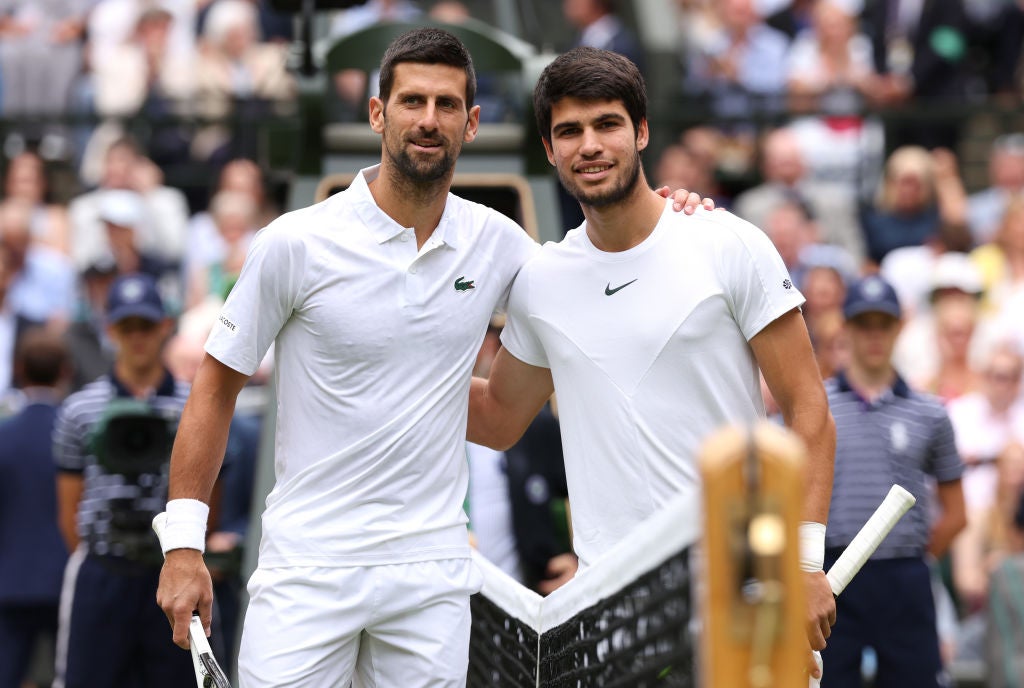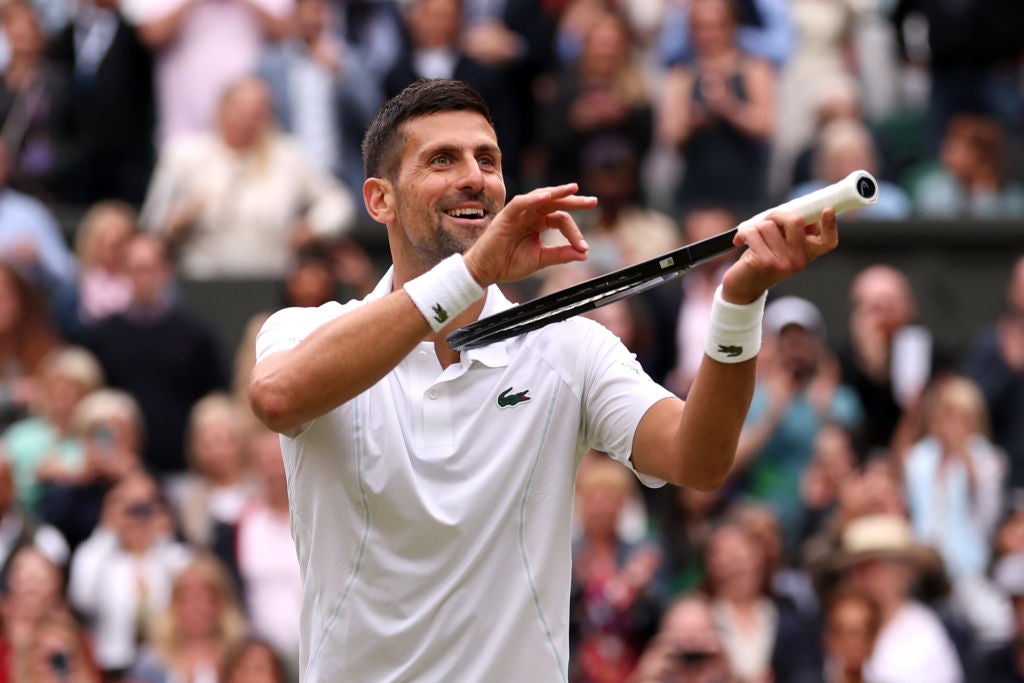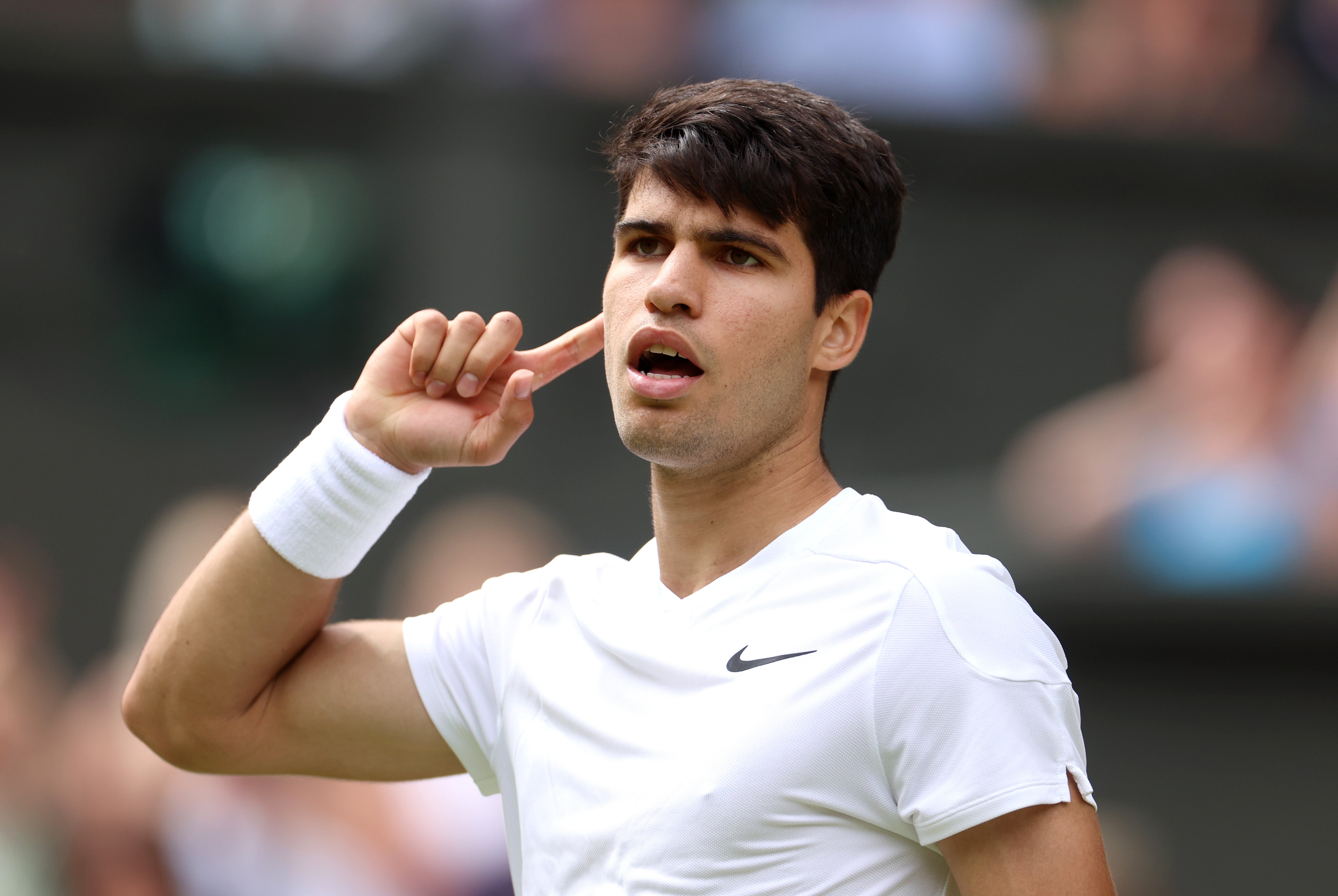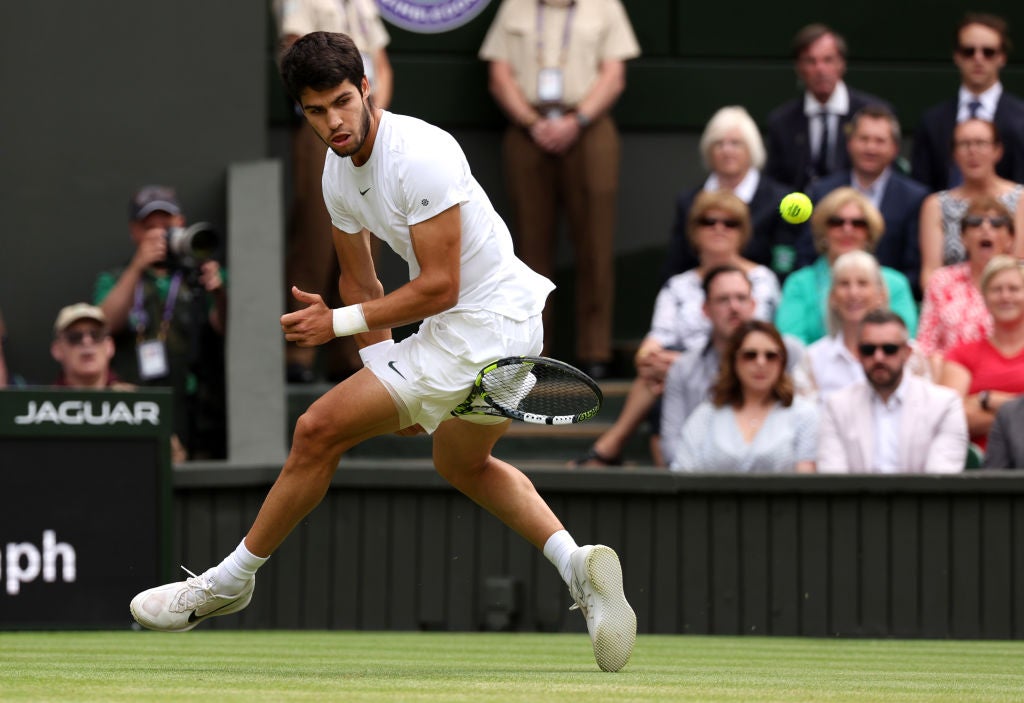Novak Djokovic, Carlos Alcaraz and the twist to an epic Wimbledon final rematch
There will be an instant rematch of last year’s epic Wimbledon final as Djokovic the underdog takes on the defending champion Alcaraz on Centre Court

Your support helps us to tell the story
From reproductive rights to climate change to Big Tech, The Independent is on the ground when the story is developing. Whether it's investigating the financials of Elon Musk's pro-Trump PAC or producing our latest documentary, 'The A Word', which shines a light on the American women fighting for reproductive rights, we know how important it is to parse out the facts from the messaging.
At such a critical moment in US history, we need reporters on the ground. Your donation allows us to keep sending journalists to speak to both sides of the story.
The Independent is trusted by Americans across the entire political spectrum. And unlike many other quality news outlets, we choose not to lock Americans out of our reporting and analysis with paywalls. We believe quality journalism should be available to everyone, paid for by those who can afford it.
Your support makes all the difference.Although it is the rematch he has waited a year for, it was only until a few days ago that Novak Djokovic started to believe he could face Carlos Alcaraz in the Wimbledon final. When the 37-year-old underwent surgery on a torn medial meniscus in his right knee on 5 June, it was assumed that the seven-time champion would miss the tournament he places above all others. There were doubts, he admitted, but because it was Wimbledon, Djokovic did everything he could to make the start line. “I was not thinking about, particularly in the first couple of matches, of the eventual title match,” he said. And yet, here we go again.
Alcaraz is the only player to beat Djokovic in his last 51 matches on Centre Court, his epic five-set victory in last year’s final ending a run of four consecutive titles at Wimbledon. The 21-year-old Spaniard will be the favourite when he faces Djokovic in the rematch, in part due to the Serbian’s knee and any lingering questions over his fitness, but also because of how Alcaraz has inherited Djokovic’s powers of inevitability since capturing last year’s title. If you can beat Djokovic on Centre Court once, you can do it again, and Alcaraz is a stronger, more confident player than 12 months ago.
Djokovic sees similarities between himself and his younger opponent. He believes Alcaraz is “as complete a player as they come” and said after last year’s final that the Spaniard’s game was a perfect blend of the sport’s “Big Three”. It is fitting, therefore, that Alcaraz is bidding to become the first player since Djokovic, Rafael Nadal and Roger Federer to win the French Open and Wimbledon in the same summer, in what is one of the toughest challenges in the sport. “It’s going to take the best of my ability to beat him,” Djokovic said.

There is no shortage of motivation. Djokovic will be playing for revenge and with history on the line, a record-equalling eighth men’s title to join Federer and 25th grand slam title to surpass Margaret Court just one win away. But is Djokovic capable of producing the level required to beat Alcaraz, so soon after surgery? Lorenzo Musetti insisted he had played the best version of Djokovic after his defeat in straight sets in the semi-finals. “He showed he’s in great shape, not only in tennis,” Musetti said. “It was a joke at the end how he was returning."
Djokovic, though, has benefitted from the more favourable draw. He has not faced an opponent who will push him quite like Alcaraz. “He already beat me here in a Wimbledon final in a five-set thriller so I don’t expect anything less than a huge battle,” Djokovic said. Which, incidentally, is exactly what Alcaraz loves. “I try not to think that I’m the defending champion,” he said. “I just go into every match thinking that obviously I have chances to lose. Every match, it’s a war.”
This has been a demanding tournament for Alcaraz, too, a little different from his journey to last year’s final where everything was so loose and carefree. But the champion, who now has something to lose, has become so hard to beat: while Alcaraz has not won in straight sets since the second round, losing the opening set in three of his last four matches in returning to the final, the Spaniard has developed a supreme confidence that he can escape any hole he finds himself in. He did so in last year’s Wimbledon final, of course, but it has strengthened since winning the French Open last month.

At Roland Garros, Alcaraz was two sets to one down in the semi-finals to Jannik Sinner and in the final to Alexander Zverev, yet he came back to win the fourth and fifth and claim his third grand slam title. His fifth-set record has improved to 12-1 and his only defeat when matches have gone the full distance was as an 18-year-old, against Matteo Berrettini in the third round of the Australian Open. Beyond the enthralling style and the stunning winners conjured from the unlikeliest positions on the court, the one thing about Alcaraz’s game that has become predictable is his ability to battle back.
And yet, for such a complete player, who has all the tricks and weapons in the book, it remains remarkable that Alcaraz has been required to come from behind so often. There have been signs on court that Alcaraz sometimes finds this all a little too easy, as if becoming a little bored of following the routine, sensible shots.

Alcaraz has put that down to nerves, which he has spoken about throughout the Championships. “When you’re not controlling it, it’s difficult to play your best tennis or to deal with the situations,” he said after beating Daniil Medvedev in the semi-finals, where he lost the first set on a tiebreak. “I was struggling to play my service games calm,” he said. “It was in a rush. I was nervous. Daniil was controlling the match.”
But for Alcaraz, the key to navigating such difficult moments in a sport that demands perfection across a range of complex areas is startlingly simple: tennis is a game, and games are to be enjoyed. Alcaraz wants to have fun and will continue to go for the sublime winners because that’s how he plays his best tennis. “Sometimes it’s a disaster,” Alcaraz said. “But [it] helps me a lot to relax, smile, that I’m having fun on the court.” Over five sets, Alcaraz knows he has time to settle himself and find the spark required to turn the match around.
And so Djokovic will again meet the smiling assassin, the most dangerous opponent for him to face, and one who has stared him down in the fifth set of a grand slam and won. However, for Djokovic, for once the underdog, against the Centre Court crowd and Wimbledon’s new favourite, rarely would a victory have tasted so sweet.
Coverage of the men’s final starts on Sunday 13 July at 1pm on BBC1, with the game starting at 2pm



Join our commenting forum
Join thought-provoking conversations, follow other Independent readers and see their replies
Comments